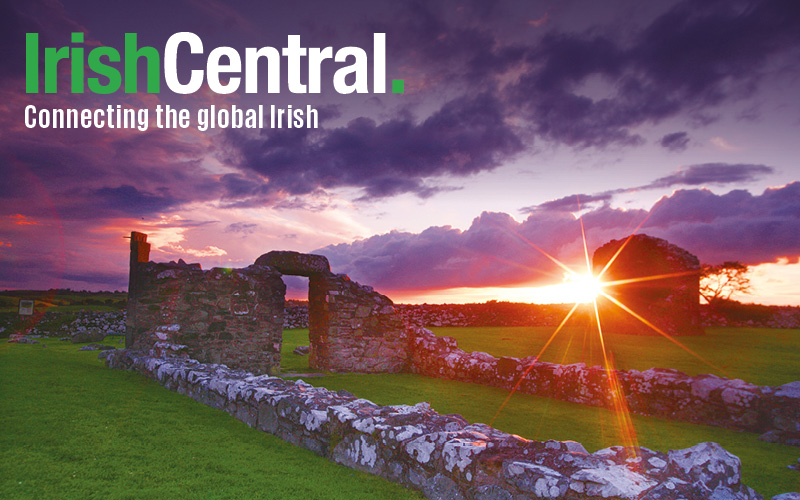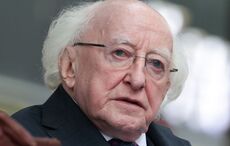It’s all systems go for the Irish general election. Today Taoiseach (Prime Minister) Enda Kenny traveled to the residence of Ireland’s president, Michael D. Higgins and asked him to dissolve the current Dail, the 31st since independence. He named the date as February 26th, so the contest begins.
in truth, the campaigning and door-to-door canvassing have already started. Eager newcomers are making their case to the voters while nervous incumbents plead to retain their seats.
It's exciting in its way but somewhat less colourful than the US presidential campaign. While there might be a few candidates here and there who share Donald Trump's worldview none can match him as a colorful grabber of headlines and no Irish politician has anything like the same bank balance.
The leader of the Irish Labor Party, Joan Burton, was in the spotlight at the weekend. She was addressing her party's annual conference at a hotel in the midlands town of Mullingar. The last general election in 2011 was a spectacular success for Labour who got 37 candidates elected and became the second-biggest party in Dáil Éireann, the main house of the Irish parliament. This time it is likely to be different.
Labour's election message could be summed-up by the song-lyric, "accentuate the positive/eliminate the negative". The party is calling for votes on the basis that it exercised a restraining hand on Fine Gael in the outgoing government and should be allowed to continue in similar fashion for another five-year term of office.
Although they are not using the slogan "Cling to nurse for fear of something worse", that in essence is what they are saying.
The mantra that Labour can be trusted to prevent Fine Gael from implementing hard-right policies was repeated again and again at the party conference. Delegates I met insisted that voting for the likes of Fianna Fail and Sinn Fein was a recipe for instability and potential chaos. They pointed to the example of Spain where a general election took place on December 20th last but a government had still not been formed. Voting for the populist left-wing party Podemos had solved nothing, they said, and the same would happen if Irish people supported Gerry Adams and his followers.
Sinn Féin, for its part, was quick to respond. Adams issued a statement recalling the famous pledge by Eamon Gilmore prior to the last general election to show the Frankfurt-based European Central Bank that Labour was boss. The Sinn Fein leader said: “Labour claimed it would stand up to the ECB but instead of ‘Labour’s way’, we got ‘Frankfurt’s way’."
He added: “What is the point of a Labour Party which again and again offers itself as a mudguard for Fine Gael, enabling the imposition of regressive budgets and unfair policies?"
We are going to hear many exchanges of a similar nature in the coming weeks. Election campaigns actually do matter and the position of the parties can change significantly between the start of the race and the day when people cast their ballots.
The mood at the present moment suggests that Fine Gael will do reasonably well, with between 50 and 60 seats, but that Labour will suffer substantial losses and be lucky to return a dozen TDs. The two parties have a very comfortable majority in the outgoing government but that seems a very unlikely prospect this time out. Fortunately for them, there should be plenty of hungry TDs of the non-party variety, not to mention some of the smaller fringe parties, who will be eager to provide backing to the Government in return for concessions of different kinds, especially the provision of facilities and other forms of State support to their own constituencies. Having just come through a general election campaign, Independent TDs in particular will not relish the thought of "going to the country" again in such a short time.
The latest Red C opinion poll published in the Sunday Business Post newspaper puts Labour at ten per cent, up one point from the company's previous survey and, if this trend continues, the party might have a decent election after all. Labour bigwigs are talking-up the prospect of getting 20 seats but so far this looks like fantasy land.
Fianna Fail dropped two points to 17 per cent which does not suggest that the public are champing at the bit to vote for them. Micheál Martin's party is starting from a very low base and has no TDS at all in the Dublin constituencies. Nevertheless, Fianna Fáil should go up by ten or more and have more than 30 TDs next time.
Sinn Fein is holding steady at 19 per cent but a spectacular rise in its Dáil membership may still be out of the question. The party was expected to double its representation and come back with up to 30 Deputies but might have to settle for a figure in the mid-twenties instead.
The austerity of recent years has eased somewhat, with Fine Gael the main beneficiaries and the drop of a single point by Enda Kenny's party to 29 per cent is not considered significant.
At this very early stage, it looks as if Kenny will hold onto his job as Taoiseach, with support from Labour and TDs in the category called "Independents and Others". The opposition is a bit of a mess: Fianna Fail leader Micheál Martin has been extremely critical of Sinn Féin because of the latter party's highly-controversial history with the IRA and it would be very difficult for him to turn around and go into coalition with Adams even if the numbers were right. Given the improved outlook for Fine Gael it does not look as if Kenny & Co will need to approach Martin to form a government, although some elements in and around Fianna Fáil would find the prospect of a ministerial job very appealing indeed.




Comments